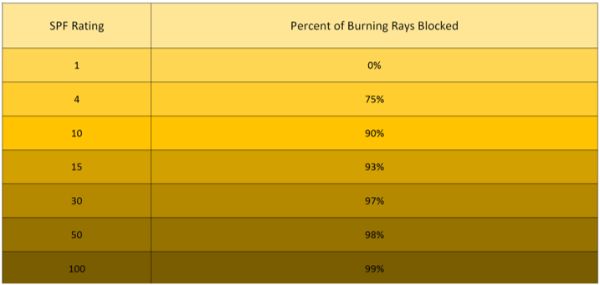Sunburn is Canceled! | SPF 101
Since we were kids, we’ve always been told to wear sunscreen before going outside. Did you consider how important sunscreen was then? Probably not. Luckily for you, your family probably took it upon themselves to make sure that your sunscreen was always properly applied. Now that we’re older, it’s up to us to make sure that our skin is protected from the sun! We know that sunscreen is important, but do you know just how important? Let’s clear up some confusion about sunscreen, explain its importance, and teach you how to pick the perfect SPF products! We won’t get burned this summer! Sunburn is CANCELED!
Dangers of Not Protecting your Skin from the Sun
Sunscreen protects us from harmful UV rays that come from the sun. Because the sun is so powerful, these rays are able to reach us whether it’s cloudy, or sunny. UV rays penetrate our skin and make us vulnerable to sun damage. Therefore, wearing sunscreen decreases your likelihood of getting sunburned. Most importantly, sunscreen helps decrease your risk of skin cancer. SPF is more important now than ever because the ozone layer is depleting, which increases our risk of sun damage from UV rays.
Clearing Up Confusion: Sunscreen Explained
There’s lots of confusion regarding sunscreens. There are different SPFs, different UV rays, different spectrums…and all of this information can begin to feel overwhelming. However, it’s important to understand this terminology so that you’ll know how to best protect your skin. Let’s break down everything you need to know about sunscreen!
What Does SPF Really Mean?
SPF means sun protection factor. It indicates the proportion of UV rays you’ll be protected from. For example, SPF 30 block 97% of the sun’s rays, SPF 50 blocks 98%, and SPF 100 blocks 99%. There is no sunscreen on the market yet that blocks 100% of the sun’s rays. Remember, higher SPF does NOT equal longer coverage!
The sun gives off two types of UV radiation rays: UVA and UVB. UVA rays penetrate deep through the thickest layer of skin, while UVB rays burn the top layers. It’s important to choose a sunscreen that protects you from both types of rays.
Who Should Use Sunscreen?
EVERYONE! Sunscreen is for everyone! There’s a myth that it’s not as necessary for people with darker skin to use sunscreen. Darker skin means a higher melanin content. Melanin does offer some natural UV radiation protection, but only to a certain extent. Everyone should use sunscreen regardless of skin tone.
Can Sunscreens Really be Waterproof?
Water resistant does not mean waterproof! There are no sunscreens on the market that are waterproof. However, there are water resistant sunscreen options that are great for swimmers! These types of sunscreens last longer in water and if you sweat, but they need to be reapplied more often to keep working. SPF products that make the claim to be water resistant must specify on the label if they last 40 or 80 minutes after coming into contact with water.
Choosing the Right Sunscreen
Choosing the right sunscreen is key in sun protection! The most important factor that you should consider when choosing a sunscreen is whether it offers broad spectrum protection. Broad spectrum sunscreens protect against both UVA rays and UVB rays. It’s important to be protected from both types of UV rays!
Now that you’ve narrowed down you sunscreen options to broad spectrum formulas, let’s make sure we choose the right SPF! It is recommended that you choose an SPF of 30 or higher. SPF 30 blocks 97% of the sun’s burning rays. An SPF any lower could be risky.

Bottom line, when choosing a sunscreen, make sure that it’s broad spectrum with an SPF of 30 or higher.
Properly Using your Sunscreen
Once you’ve picked the right sunscreen, you should make sure that you’re using it properly. Always apply your sunscreen 15 minutes before you go outside. Otherwise, your skin could still burn if the sunscreen isn’t fully absorbed. When you’re applying, make sure that you fully cover all exposed parts of your body with your sunscreen. You should also always reapply your sunscreen every 2 hours, and immediately after swimming or sweating. If you’re spending the day away from home, be sure to bring your sunscreen with you!
If you’re spending a lot of time outside (hello lifeguards), you MUST protect your skin! Applying sunscreen may feel like an annoying task sometimes, but it could save your life! If you hate traditional sunscreens, try a sunscreen spray for easier application. Just make sure you’re careful to cover every part of exposed skin with the product. If you wear makeup, try a powder or setting spray with SPF! There’s no excuse to get burned this summer! Check out the top sunscreens of 2019 here!

